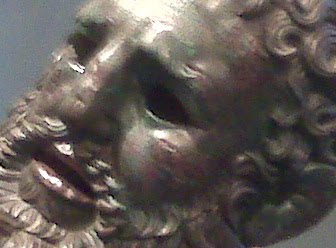I really cannot remember when I've had so much fun in front of the TV set with my clothes on. I'm talking about "Playing Shakespeare," the set of master classes by British direcctor John Barton, recently (re?)released (after 27 years!) on video by the BBC. I heard about them on the radio in the car and by the time I got home Mrs.B, bless her heart, had ordered them. We've been making our leisured way through all week. We're not done yet, but I really can't contain my enthusiasm for anything so engaging, so instructive and so much fun.
I am, let the record show, a pretty big Shakespeare fan, but I know next to nothing about the mechanics of acting--my last outing on the stage when I played the king of something or other in Mrs. Wallingford's eighth grade.* So I am an eager and perhaps gullible pupil. In this light I got double pleasure: one, watching actors work and rework individual scenes to seek different levels of understanding; and two, to watch Barton's own suave cajolery as he undertakes to transmit his (obviously deeply held) views. He's a remarkable figure in his own right. If I count correctly he is now in his 80s; he was a founder of the Royal Shakespeare Company in 1960, and you can still find him showcased at the RSC website, directing a legendary performance of
Twelfth Night with Judi Dench as Viola (in 1969). His own enthusiasm for Shakespeare is contagious, and his knack for extracting non-obvious (but plausible) nuances out of sometimes-familiar material is nothing short of formidable.
A spectacularly successful example is his work with Alan Howard on a speech by Richard II. Howard had played Richard with great success at the RSC; he and Barton seemed to agree that Richard's tragedy is that he is so much of a
poseur that he never comes to recognize his own self. The sample under inquiry was the passage that begins "For God's sake let us sit upon the ground/And tell said stories of the death of kings..." Through successive readings, Barton helped Howard to find subtlety and complexity in the speech: Howard's Howard starts off bluff, almost cheerful, but as he warms to his subject, he becomes the poet of his own life, observing--even enjoying--his great downfall.
Another great felicity of the series is that it gives us a chance to see so many actors we all know from other phases in their career: here's Barton's own Viola, Judi Dench; here also Howard, but also Patrick Stewart of Start Trek fame, and Ben Kingsley, who must have just then been enjoying the first fruits of his success as
Gandhi (and for a Gandhi, it is amazing how much barely-contained anger Kingsley appears to carry around with him. We also have David Suchet, well known to PBS audiences as Hercule Poirot; here also my own favorite Cleopatra, Jane LaPotaire. And there are a number of others.
Barton offer any number of insights that will enlighten even a seasoned viewer. For example, in exploring
Merchant of Venice, Barton shows how the audience's view of Shylock is determined by what
Tubal--aside from Shylock's daughter, the only other Jewish play--thinks of Shylock. We can see that if Tubal accepts Shylock's scheming without question, why then so do we, and if Tubal raises his eyebrows, why then we raise hours.
I don't know, for an old hand at the stage this might be old stuff. But there is so much about the mechanics of stagecraft that I don't know, that I find myself sucking up every moment. I know I'll watch it again and I only wish it were twice as long.
Afterthought: Based on what I've seen so far, Barton seems to own only one necktie--a poor, sorry, ill-fitting knitted thing. Although this was shot some 27 years ago, something tells me that he still owns only one tie, and that this is still the one. If I knew where to reach him, I'd mail him another.
==
*I did sign up for a community college acting class back about 32 years ago in my most recent bachelorhood. I was mostly looking for babes; I found mostly drama queens.
 "[T]he Seated Boxer; an extraordinary bronze found near the Baths of Constantine on the Quirinal hill. His body slumps forward; his forearms ret on his thighs; his hands hang limp, pulled down by the weight of studded leather wrappings. His upturned face, cut and swollen, looks for a victory he does not expect.
"[T]he Seated Boxer; an extraordinary bronze found near the Baths of Constantine on the Quirinal hill. His body slumps forward; his forearms ret on his thighs; his hands hang limp, pulled down by the weight of studded leather wrappings. His upturned face, cut and swollen, looks for a victory he does not expect. Text lifted wholesale from the best tour guide to Rome I've ever seen: James H.S. McGregor, Rome From the Ground Up 103-104 (2005, 2006). McGregor says that the Boxer is in the Aula Ottagona; he has been moved to the Palazzo Massimo alle Terme, and h/t to Steve for insisting that I seek out this superb museum, hitherto unnoticed by me.
Text lifted wholesale from the best tour guide to Rome I've ever seen: James H.S. McGregor, Rome From the Ground Up 103-104 (2005, 2006). McGregor says that the Boxer is in the Aula Ottagona; he has been moved to the Palazzo Massimo alle Terme, and h/t to Steve for insisting that I seek out this superb museum, hitherto unnoticed by me.